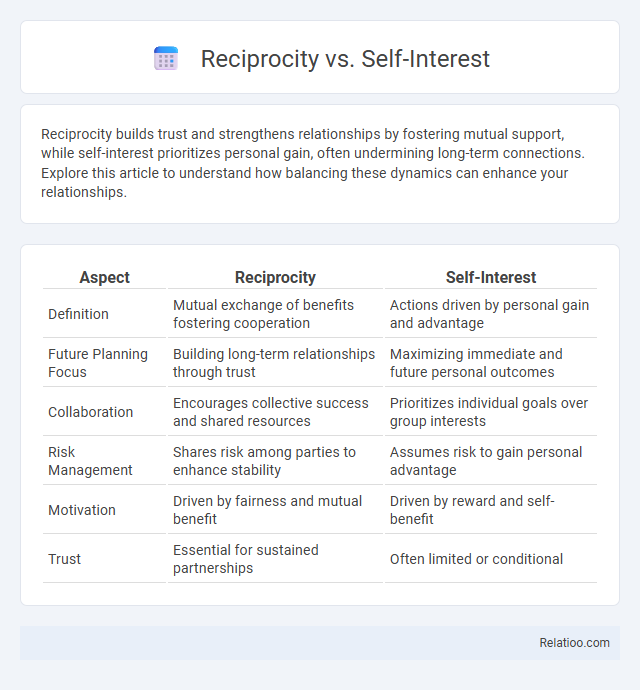Reciprocity builds trust and strengthens relationships by fostering mutual support, while self-interest prioritizes personal gain, often undermining long-term connections. Explore this article to understand how balancing these dynamics can enhance your relationships.
Table of Comparison
| Aspect | Reciprocity | Self-Interest |
|---|---|---|
| Definition | Mutual exchange of benefits fostering cooperation | Actions driven by personal gain and advantage |
| Future Planning Focus | Building long-term relationships through trust | Maximizing immediate and future personal outcomes |
| Collaboration | Encourages collective success and shared resources | Prioritizes individual goals over group interests |
| Risk Management | Shares risk among parties to enhance stability | Assumes risk to gain personal advantage |
| Motivation | Driven by fairness and mutual benefit | Driven by reward and self-benefit |
| Trust | Essential for sustained partnerships | Often limited or conditional |
Understanding Reciprocity and Self-Interest
Understanding reciprocity involves recognizing the mutual exchange of benefits where both parties gain value, fostering cooperation and trust. Self-interest drives individuals to prioritize personal gains, often motivating actions that ensure survival or success but can limit collaboration. Balancing your self-interest with reciprocal behavior enhances relationships and paves the way for mutual growth.
Historical Context: Evolution of Social Exchange
Reciprocity, self-interest, and mutual growth have shaped human interactions throughout history, evolving from simple barter systems in ancient societies to complex economic and social exchanges in modern times. Early hunter-gatherer communities relied on reciprocity to maintain group cohesion, while self-interest gradually influenced trade and market economies during the Renaissance, emphasizing individual gain. The Industrial Revolution and contemporary globalization introduced the concept of mutual growth, highlighting cooperative strategies that foster long-term shared benefits among nations and businesses.
Psychological Foundations of Reciprocity
The psychological foundations of reciprocity are rooted in social exchange theory, which posits that people are motivated to return favors to maintain social balance and trust. Your behavior in reciprocal relationships often reflects an unconscious drive to uphold fairness and avoid feelings of indebtedness or guilt. Understanding these psychological underpinnings can enhance your ability to foster mutual growth by aligning self-interest with cooperative interactions.
Self-Interest: The Drive Behind Personal Gain
Self-interest drives individuals to prioritize actions that maximize their own benefits and personal gain, often motivating decision-making in business and daily life. Understanding your self-interest enables you to recognize how personal goals align with broader opportunities for success. While self-interest fuels ambition, balancing it with reciprocity and mutual growth fosters sustainable and collaborative outcomes.
Comparative Analysis: Reciprocity vs Self-Interest
Reciprocity emphasizes mutual exchange and balanced benefits, fostering trust and long-term relationships, whereas self-interest prioritizes individual gain, often at the expense of others. In strategic decision-making, reciprocity encourages cooperation and sustained partnerships, while self-interest can drive competitive behavior and short-term advantages. Comparative analysis shows that reciprocity leads to collective value creation, contrasting with self-interest's tendency toward isolated, transactional outcomes.
Impact on Relationships and Social Dynamics
Reciprocity fosters trust and cooperation by encouraging balanced exchanges that strengthen social bonds, while self-interest prioritizes individual benefits, often leading to competitive or transactional interactions. Mutual growth promotes collaborative efforts where all parties invest in shared success, enhancing long-term relationship quality and social cohesion. Understanding these dynamics helps you navigate social environments effectively, optimizing both personal and communal outcomes.
Reciprocity in Business and Workplace Settings
Reciprocity in business and workplace settings fosters trust and collaboration by encouraging employees and partners to exchange resources, support, and information mutually. This principle drives stronger relationships and increased loyalty, as individuals are more willing to contribute when they feel valued and recognized. By embracing reciprocity, your organization can enhance teamwork, improve communication, and create a culture of shared success that benefits all stakeholders.
Ethical Implications of Both Approaches
Reciprocity fosters ethical interactions by encouraging fairness and trust, promoting balanced exchanges that prioritize the well-being of all parties involved. In contrast, self-interest-driven actions may lead to ethical dilemmas, as prioritizing personal gain risks exploitation and undermines collective trust. You can achieve sustainable and ethical outcomes by emphasizing mutual growth, where collaborative efforts ensure shared benefits and long-term positive relationships.
Cultural Perspectives on Reciprocity and Self-Interest
Cultural perspectives on reciprocity reveal significant variation in how societies balance self-interest and mutual growth, with collectivist cultures often prioritizing reciprocal relationships that strengthen communal bonds over individual gain. In contrast, individualistic cultures tend to emphasize self-interest, viewing reciprocal exchanges more as strategic transactions to maximize personal benefit. These differing cultural frameworks influence negotiation styles, trust-building, and collaboration, underscoring the importance of understanding cultural context in global interactions.
Striking the Balance: Integrating Reciprocity and Self-Interest
Striking the balance between reciprocity and self-interest involves fostering relationships where mutual benefits align with individual goals, creating sustainable interactions that promote trust and cooperation. Integrating reciprocity ensures that actions consider others' needs, while self-interest drives personal motivation and resource optimization. This synergy enhances mutual growth by encouraging collaboration without sacrificing personal objectives, leading to long-term success and collective value creation.

Infographic: Reciprocity vs Self-interest
 relatioo.com
relatioo.com